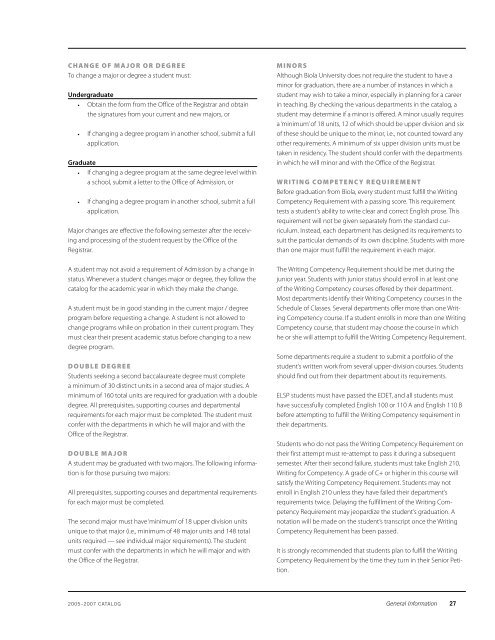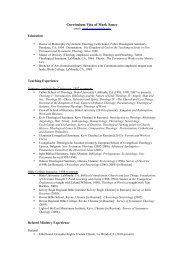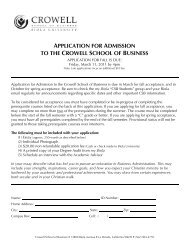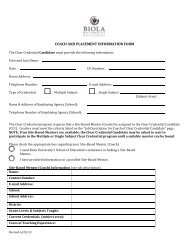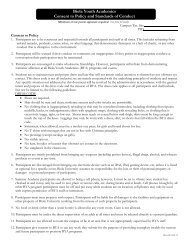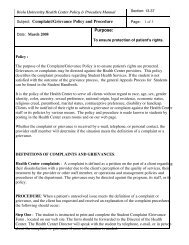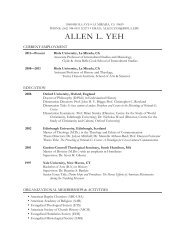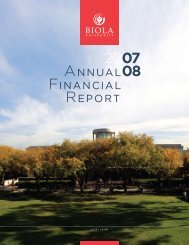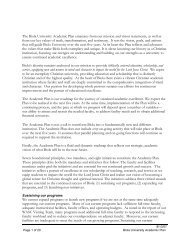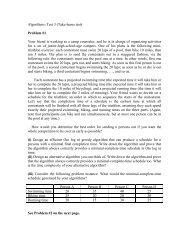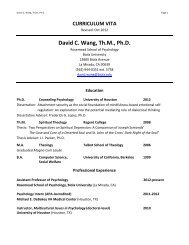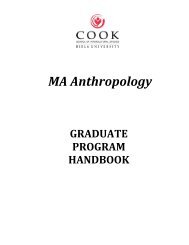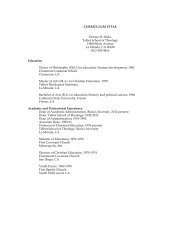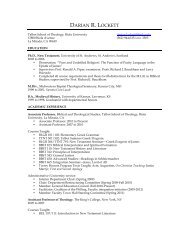You also want an ePaper? Increase the reach of your titles
YUMPU automatically turns print PDFs into web optimized ePapers that Google loves.
C h a n G e o f m a j o r o r d e G r e e<br />
To change a major or degree a student must:<br />
Undergraduate<br />
• Obtain the form from the Office of the Registrar and obtain<br />
the signatures from your current and new majors, or<br />
• If changing a degree program in another school, submit a full<br />
application.<br />
Graduate<br />
• If changing a degree program at the same degree level within<br />
a school, submit a letter to the Office of Admission, or<br />
• If changing a degree program in another school, submit a full<br />
application.<br />
Major changes are effective the following semester after the receiving<br />
and processing of the student request by the Office of the<br />
Registrar.<br />
A student may not avoid a requirement of Admission by a change in<br />
status. Whenever a student changes major or degree, they follow the<br />
catalog for the academic year in which they make the change.<br />
A student must be in good standing in the current major / degree<br />
program before requesting a change. A student is not allowed to<br />
change programs while on probation in their current program. They<br />
must clear their present academic status before changing to a new<br />
degree program.<br />
d o U b l e d e G r e e<br />
Students seeking a second baccalaureate degree must complete<br />
a minimum of 30 distinct units in a second area of major studies. A<br />
minimum of 160 total units are required for graduation with a double<br />
degree. All prerequisites, supporting courses and departmental<br />
requirements for each major must be completed. The student must<br />
confer with the departments in which he will major and with the<br />
Office of the Registrar.<br />
d o U b l e m a j o r<br />
A student may be graduated with two majors. The following information<br />
is for those pursuing two majors:<br />
All prerequisites, supporting courses and departmental requirements<br />
for each major must be completed.<br />
The second major must have ‘minimum’ of 18 upper division units<br />
unique to that major (i.e., minimum of 48 major units and 148 total<br />
units required — see individual major requirements). The student<br />
must confer with the departments in which he will major and with<br />
the Office of the Registrar.<br />
m I n o r s<br />
Although <strong>Biola</strong> <strong>University</strong> does not require the student to have a<br />
minor for graduation, there are a number of instances in which a<br />
student may wish to take a minor, especially in planning for a career<br />
in teaching. By checking the various departments in the catalog, a<br />
student may determine if a minor is offered. A minor usually requires<br />
a ‘minimum’ of 18 units, 12 of which should be upper division and six<br />
of these should be unique to the minor, i.e., not counted toward any<br />
other requirements. A minimum of six upper division units must be<br />
taken in residency. The student should confer with the departments<br />
in which he will minor and with the Office of the Registrar.<br />
W r I t I n G Co m P e t e n C y r e Q U I r e m e n t<br />
Before graduation from <strong>Biola</strong>, every student must fulfill the Writing<br />
Competency Requirement with a passing score. This requirement<br />
tests a student’s ability to write clear and correct English prose. This<br />
requirement will not be given separately from the standard curriculum.<br />
Instead, each department has designed its requirements to<br />
suit the particular demands of its own discipline. Students with more<br />
than one major must fulfill the requirement in each major.<br />
The Writing Competency Requirement should be met during the<br />
junior year. Students with junior status should enroll in at least one<br />
of the Writing Competency courses offered by their department.<br />
Most departments identify their Writing Competency courses in the<br />
Schedule of Classes. Several departments offer more than one Writing<br />
Competency course. If a student enrolls in more than one Writing<br />
Competency course, that student may choose the course in which<br />
he or she will attempt to fulfill the Writing Competency Requirement.<br />
Some departments require a student to submit a portfolio of the<br />
student’s written work from several upper-division courses. Students<br />
should find out from their department about its requirements.<br />
ELSP students must have passed the EDET, and all students must<br />
have successfully completed English 100 or 110 A and English 110 B<br />
before attempting to fulfill the Writing Competency requirement in<br />
their departments.<br />
Students who do not pass the Writing Competency Requirement on<br />
their first attempt must re-attempt to pass it during a subsequent<br />
semester. After their second failure, students must take English 210,<br />
Writing for Competency. A grade of C+ or higher in this course will<br />
satisfy the Writing Competency Requirement. Students may not<br />
enroll in English 210 unless they have failed their department’s<br />
requirements twice. Delaying the fulfillment of the Writing Competency<br />
Requirement may jeopardize the student’s graduation. A<br />
notation will be made on the student’s transcript once the Writing<br />
Competency Requirement has been passed.<br />
It is strongly recommended that students plan to fulfill the Writing<br />
Competency Requirement by the time they turn in their Senior Petition.<br />
20<strong>05</strong>–20<strong>07</strong> <strong>Catalog</strong> General Information


